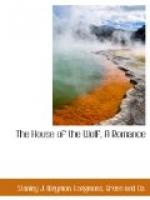I was at Cahors in 1580 in the great street fight; and there women were killed, I was with Chatillon nine years later, when he rode through the Faubourgs of Paris, with this very day and his father Coligny in his mind, and gave no quarter. I was at Courtas and Ivry, and more than once have seen prisoners led out to be piked in batches—ay, and by hundreds! But war is war, and these were its victims, dying for the most part under God’s heaven with arms in their hands: not men and women fresh roused from their sleep. I felt on those occasions no such horror, I have never felt such burning pity and indignation as on the morning I am describing, that long-past summer morning when I first saw the sun shining on the streets of Paris. Croisette clung to me, sick and white, shutting his eyes and ears, and letting me guide him as I would. Marie strode along on the other side of him, his lips closed, his eyes sinister. Once a soldier of the guard whose blood-stained hands betrayed the work he had done, came reeling—he was drunk, as were many of the butchers— across our path, and I gave way a little. Marie did not, but walked stolidly on as if he did not see him, as if the way were clear, and there were no ugly thing in God’s image blocking it.
Only his hand went as if by accident to the haft of his dagger. The archer—fortunately for himself and for us too—reeled clear of us. We escaped that danger. But to see women killed and pass by—it was horrible! So horrible that if in those moments I had had the wishing-cap, I would have asked but for five thousand riders, and leave to charge with them through the streets of Paris! I would have had the days of the Jacquerie back again, and my men-at-arms behind me!
For ourselves, though the orgy was at its height when we passed, we were not molested. We were stopped indeed three times—once in each of the streets we traversed—by different bands of murderers. But as we wore the same badges as themselves, and cried “Vive la MESSE!” and gave our names, we were allowed to proceed. I can give no idea of the confusion and uproar, and I scarcely believe myself now that we saw some of the things we witnessed. Once a man gaily dressed, and splendidly mounted, dashed past us, waving his naked sword and crying in a frenzied way “Bleed them! Bleed them! Bleed in May, as good to-day!” and never ceased crying out the same words until he passed beyond our hearing. Once we came upon the bodies of a father and two sons, which lay piled together in the kennel; partly stripped already. The youngest boy could not have been more than thirteen, I mention this group, not as surpassing others in pathos, but because it is well known now that this boy, Jacques Nompar de Caumont, was not dead, but lives to-day, my friend the Marshal de la Force.




